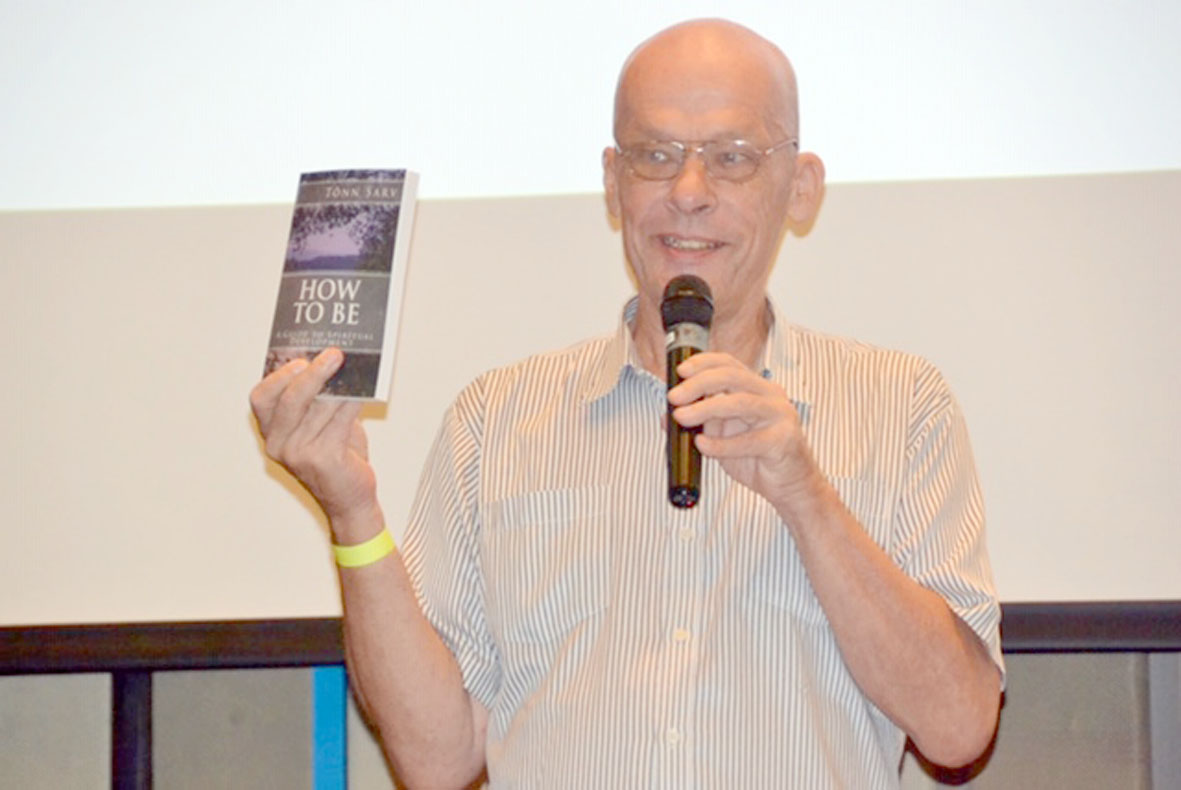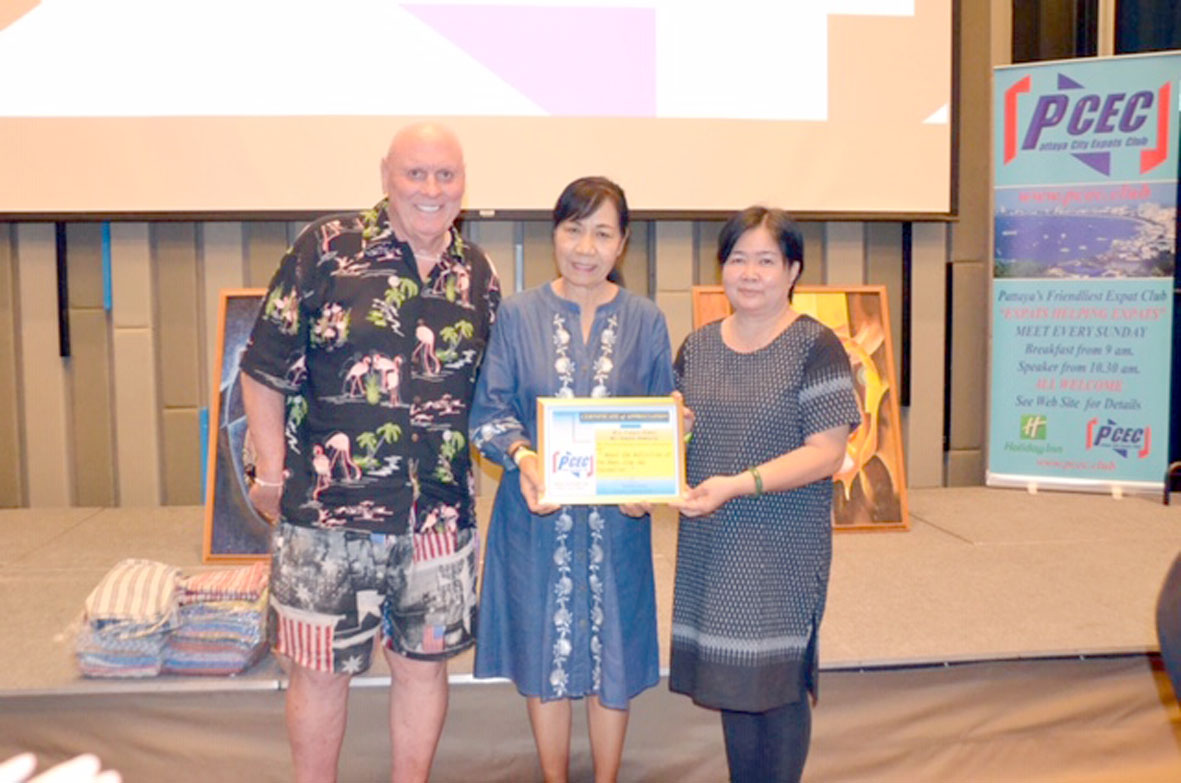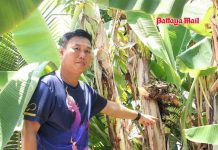
Tõnn Sarv began the Feb. 24 Pattaya City Expat Club meeting with his short talk on living as a layman in a Buddhist Monastery.
Tõnn is originally from Estonia but has spent over 15 years in Thailand. For the last two years he has been living as a lay person in the Hermitage section of the Suan Mokkh Monastery in Surat Thani Province.
The Hermitage is outside the main temple grounds and consists of separate rooms, made of concrete and set in a forest. There is no electricity outside the main buildings, and no radio, TV, or WiFi.
The daily schedule of activities at the Hermitage starts at 4 a.m. with bell ringing to announce the start of the day, followed by 4.30 meditation and chanting in both Pali and English languages, and a 30-minute Dharma talk (a discourse on Buddhist practice), Pindabat (alms round) to collect food – Pindabat is undertaken by the monks but laypersons are welcome to follow them on the rounds, then 8.30 breakfast – which serves as the one meal of the day – followed by chores of cleaning of the premises and housekeeping. A noon meditation session is followed by the afternoon spent in personal practice; 6 pm tea time, 7 pm further meditation, and 9 pm bed time.
The general rule is silence – this is not strictly observed but talk is kept to a minimum and practitioners feel little need for chatter.
There is no charge to stay at the Hermitage. Generally there are less than10 lay people there, with one monk, and all share together in activities.
The practice never becomes boring and it brings the great benefit of peace of mind, which is often not easy to find in this modern world.
Before being accepted into the Hermitage as a lay person, it is necessary to have completed one of the ten day meditation course – these take place every month at Wat Suan Mokkh, starting on the first of the month.
Tõnn was able to write and publish some books whilst in the hermitage – despite there being no electricity. Two of these (available at the meeting) were “How to Be: A Guide to Spiritual Development” and “Learn to Say Good-Bye”. Both are easily obtainable through online sources.
Next up was a presentation by Piangta Chumnoi, Director and Founder of the Children’s Home Baan Jing Jai, and Sununta Khumnunta, Secretary of the Board.
The Baan Jing Jai Foundation, dating from 1992, supports the children’s home. There are around 90 children at the home, ranging in ages from 3 to 18 years old. They are street children and victims of abuse, or abandoned and neglected. In 2010 the home was able to move to new and larger premises.
One of the key missions of the Foundation is to support Child Development and especially to prevent vulnerable children from becoming the victims of prostitution.
The children living at the home are supported through school. They also enjoy working on the home’s farm growing vegetables.
Both speakers thanked the many donors who have supported the home, especially through the sponsorship of the children’s education. They described examples of former residents who are now graduating from University and entering successful careers. More than 400 children have by now passed through the home.

When the home first started it was just a single room in which street children would come to spend the night in safety. Solvent abuse was prevalent and even some of the tiny children had sexually transmitted infections and clear indications of physical abuse.
Through the support of many donors, especially PILC, the home was able to move to larger premises and to provide the children with greater choices and life options. But it must be stressed that the home remains in need of further support.
Sununta wished to stress that she is very aware that she had been given time to present a talk and it should not become just a fund-raising exercise, but the needs of the home are so great that mention of finances was surely appropriate.
Sununta then told us about the elements of her own Christian faith and she described how, through her commitment to BJJ and her undertaking exercise, she felt she had been able to cure her own diabetes.
She is now planning a Pattaya to Chang Mai bicycle ride to raise funds for BJJ and to promote healthy exercise.
By touching the hearts of children, great change can be effected! So she hoped that by touching our hearts today, we too can understand the power of such change.
During the questions session, clarification was provided on how the children find the home: this is by word of mouth, and through referrals from the police, from volunteers working in the community and from social workers.
Sununta stressed the need to report incidents of abandoned or street children, either directly or by taking a photograph of the location with details, so that a field team of workers can be dispatched to investigate and to provide support for the children.
In explaining the founding of the home, Sununta explained that it is often necessary just to do things and start activities rather than trying to overthink them and becoming disheartened – from a simple start BJJ has been able to provide a real and valuable service to the community.
Surely, two very courageous speakers – presenting to an expatriate audience in English – sharing the personal motivations of their faith and daily beliefs.




